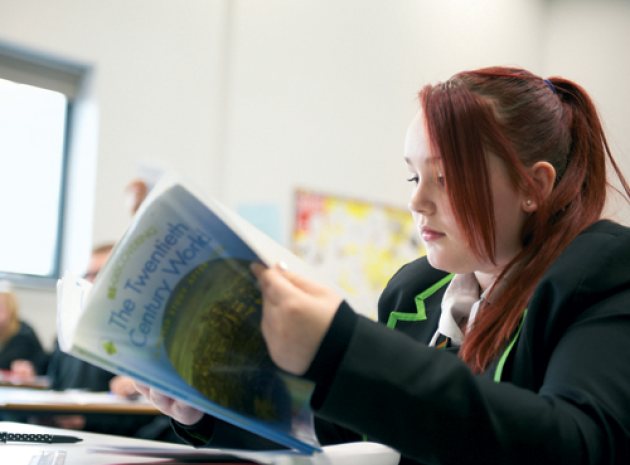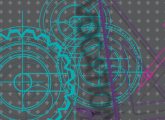Revision is a word that tends to conjure up images of stressed young people working against the clock, unrealistic timetables, and teaching methods that are less than inspiring. No one can argue with the idea that last minute cramming is far from ideal, but is it possible that we should be going further in our thinking? What might happen if we were to stop looking at revision as some sort of short term ‘vitamin supplement’ and start considering it as part of a balanced diet throughout the school year?
Recent research undertaken by O2 Learn shows that 76% of young people start revision four weeks or less in advance of exams and of those, 20% wait until seven days or less before a test to begin consolidating their learning in preparation. This is sobering news and demonstrates how easy it is for students and their teachers alike to assume that revision should start at a fixed point in the school year.
Flip Charter
At my own school (Shireland Collegiate Academy) we are creating a new structure that will embed revision, or reinforcement, as I prefer to call it, throughout the whole school year. The structure we’re using to support this is the flipped classroom teaching approach, which turns the general model of classroom-based teaching and learning on its head.
The idea of this methodology is that it locates teaching as something that happens outside the classroom. Students are given the material that they’d normally cover in a lesson in a form they can access independently. The stimulus media might include videos, powerpoints, podcasts, etc. and the student is asked to consume the material and to identify the areas where they struggle or are unclear.
Within the flipped classroom, the teacher guides and facilitates learning rather than acting as an instructor. So the application of what has been learnt by the student happens here, with the educator helping learners to consolidate their understanding and further explore a subject. In a traditional model, of course, this would typically be set as homework.
This approach allows face-to-face time to be used for richer interactive learning and reinforcement activities in which students apply what they’ve learnt outside the classroom at a deeper level. It helps students to understand their own strengths and weaknesses and to get immediate feedback rather than wait for homework to be marked.
This new structure should allow revision to become an intrinsic part of the learning process throughout the school year. Instead of starting at a fixed point – be that earlier or later – it will simply and naturally take place from the outset, providing students with on-going support.

Peer Power
The O2 Learn research also identifies that students are relying heavily on notes from class to support their exam preparation. This encourages revision to be ‘end loaded’ and to focus on last minute cramming. To address this we are building an online library of resources that is available to learners throughout the year whenever they want to revise and reinforce their learning. These are hosted on our Learning Gateway and can be accessed by students at school and at home.
A challenge here is to motivate students to use the library. We’ve invested a great deal in home grown teacher resources to help with this. Students love the authenticity of these, which brings together guidance from a whole range of educational professionals that they know – the people who work with our pupils every day and understand how they learn.
We’ve also tasked our students to work with teachers to co-create resource collections that can be used throughout the year to support revision. This joint ownership has really driven student engagement and so far year 11 students have produced furtheryourmaths.co.uk and furtheryourenglish.co.uk. These sites bring together collections of resources created by the young people themselves. They focus on the topics that the students have found difficult and that their peers are therefore also most likely to need help with.
The students themselves have largely determined the organisation of resources on the sites. We find this makes them more attractive to our young learners, and they have a more intuitive design that makes it easier for them to find what they want.
The bigger picture
One final reason not to leave revision to the last minute relates to memory and was also cited in the O2 Learn research, which suggests that spacing out smaller chunks of learning over time, and ‘interleaving’ different topics with each other, can be more effective than ‘massing’ learning together in one large amount, or trying to learn by ‘cramming’. This move away from a traditional model of pre-exam revision can cause students to feel they will forget information in the long term, but the research points out that its actually the effort that must be made to recall the information that facilitates true learning. So, by including ‘revision’ from the beginning, and encouraging it to be considered and experienced as an ongoing process there is simply more time for students to recall what they learn, which should offer everyone a truly balanced – and effective – diet for the year.
Stats attack
76% of young people start revision, on average, four weeks or less in advance of a test.
86% of parents these days are actively involved in their child’s revision.
58% of adults recall having no parental involvement at all for their own revision.
83% of pupils revise with notes from class, and 77% use practice papers. only 32% try online study guides, and just 12% turn to online videos.
Data based on three surveys conducted by edcoms for o2 learn: one with 1,000 14-16s across the uk; one with 1,000 parents of 14-16s across the uk; and one with a sample of around 400 teachers registered with o2 learn.
About the author
Sir Mark Grundy is executive principal of Shireland Collegiate Academy and a member of the judging panel for o2 learn. More information on the o2 learn research can be found by visiting o2learn.co.uk and searching ‘revision research’.










